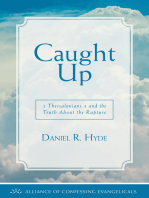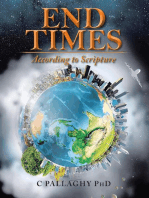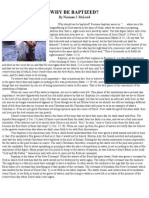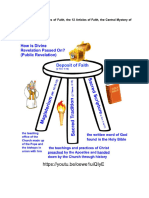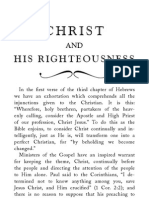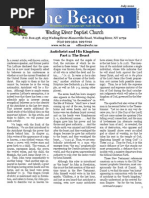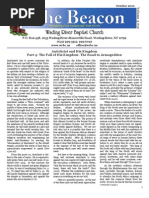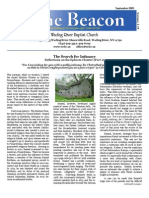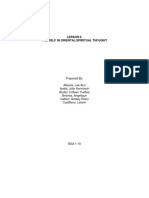May10 Beacon (Modified)
May10 Beacon (Modified)
Uploaded by
cglassCopyright:
Available Formats
May10 Beacon (Modified)
May10 Beacon (Modified)
Uploaded by
cglassCopyright
Available Formats
Share this document
Did you find this document useful?
Is this content inappropriate?
Copyright:
Available Formats
May10 Beacon (Modified)
May10 Beacon (Modified)
Uploaded by
cglassCopyright:
Available Formats
May 2010 Volume 5 #5
Wading River Baptist Church
P.O. Box 438, 1635 Wading River-Manorville Road, Wading River, NY 11792 (631) 929-3512; 929-6022 www.wrbc.us office@wrbc.us
The Rapture: the Imminent Return of Christ for His Church
Several weeks ago, I had the opportunity to spend part of an afternoon out on the boat belonging to our brother Chris Hallstrom. We launched the boat from Moriches Bay, and it was not long before we realized that there were seals swimming in the water. However, the seals were not always visible. Periodically their heads would pop up above the surface of the water for a moment, but if we werent paying close attentionour eyes scanning the water around the boatsuch events could easily pass unnoticed to us. Thus, in order to witness the seals emerging from the water, we had to watch carefully. Many of us have had the experience of waiting for a family member to return home after a several-day absence. Perhaps over the telephone this person assured you that they would be there soon, but due to uncertainty with the traffic or the weather the exact time of their arrival was unknown. In our eager anticipation, we believe that this loved one could arrive at any moment. I remember as a boy when my father was returning from a business trip, I would stand in our family room staring out of a window that offered a view down our driveway. I understood that at any moment my father might return, and I was watching for the headlights of his car which would shine brightly in the nighttime darkness of our small rural town. We who are Christians know Someone of supreme importance whose return we should be watching diligently for: the Lord Jesus Christ. According to Philippians 3:20, our citizenship is in heaven, from which also we eagerly wait for a Savior, the Lord Jesus Christ. Christians possess a heavenly citizenship[we] are not of the world, even as [Jesus Himself is] not of the world (Jn 17:16). In Titus 2:13, we are told to be looking for the blessed hope and the appearing of the glory of our great God and Savior, Christ Jesus. The promise of our Lords return is found in Gods inspired and inerrant Word, and thus we dare not dismiss this reality lest we be caught unprepared. In the Book of Revelation, chapter 22the final chapter of the Biblethe Lord Jesus declares three times that His return would be soon: And behold, I am coming quickly. Blessed is he who heeds the words of the prophecy of this book (v. 7); Behold, I am coming quickly, and My reward is with Me, to render to every man according to what he has done (v. 12); Yes, I am coming quickly (v. 20). The term we use for the return of the Lord Jesus for His church is the Rapture. The word rapture means to be caught up; to be snatched up; to be taken or carried away suddenly. At the Rapture, the Lord Jesus will remove His church, which is identified in Scripture as both His body and His bride, from the world. We are told in 1 Corinthians 15:52 that the Rapture will be instantaneous; it will occur in a moment, in the twinkling of an eye. The Rapture is what we refer to as an imminent event. Gerald B. Stanton explains what we mean by imminent in his book, Kept From the Hour (1964): As applied to the coming of the Lord, imminency consists of three things: (1) the certainty that He may come at any moment, (2) the uncertainty of the time of that arrival, and (3) the fact that no prophesied event stands between the believer and that hour. The purpose of such imminency is that the Church may be in a constant state of expectancy, always looking for and waiting for the coming of her Lord from heaven. Let us examine two passages from the New Testament which teach important truths about our Lords coming. The first passage is John 14:1-3, which records the words spoken by the Lord Jesus to His disciples in the upper room on the night He was betrayed. The second passage is 1 Thessalonians 4:13-18, wherein the Apostle Paul explains the Rapture in greater detail. First, we see that both the Lord Jesus and Paul intended their words to be words of comfort. Jesus opens with, Do not let your heart be troubled (v. 1). He had just predicted His own betrayal and had informed His disciples that He would soon be leaving them: Little children, I am with you a little while longer. You will seek Me; and as I said to the Jews, now I also say to you, Where I am going you cannot come (Jn 13:33). Opening with comforting words would also help His disciples to bear the more difficult truths that He would reveal, such as the worlds hatred of them (Jn 15:18-19). Likewise, in the second passage, Paul concludes his thought with, Therefore comfort one another with these words (v. 18). Paul is seeking to console those believers in Thessalonica who may have been grieving over the death of Christian brethren and who themselves were struggling with uncertainty. Second, personal faith in Jesus Christ as Lord and Savior is required to be a participant in the Rapture. Jesus says, believe in God, believe also in Me (v. 1). And Paul writes, For if we believe that Jesus died and rose again, even so God will bring with Him those who have fallen asleep in Jesus (v. 14). We have already seen that the Rapture will occur suddenly; it will also occur selectively. Those who have not repented of their sin and believed on the Lord Jesus Christ are not part of His body, the church, and thus will be excluded from this glorious meeting with Himthey will remain on the earth to undergo seven years of Gods judgment upon the earth, a period known as the Tribulation. The Rapture will continued on page 2
continued from page 1 mark the conclusion of the present dispensation of grace (also known as the church age or the dispensation of the Spirit). That believers will be spared from Gods wrath poured out during the Tribulation is made clear by the Apostle Paul when he commends the Thessalonian Christians at the beginning of his letter: For they themselves report about us what kind of a reception we had with you, and how you turned to God from idols to serve a living and true God, and to wait for His Son from heaven, whom He raised from the dead, that is Jesus, who rescues us from the wrath to come (1 Thess 1:9-10). Turning to Revelation, the message to the church in Philadelphia also promises the pretribulational coming of Christ to claim His church out of the world: Because you have kept the word of My perseverance, I also will keep you from the hour of testing, that hour which is about to come upon the whole world, to test those who dwell on the earth (Rev 3:10). Third, both passages affirm the promise of Jesus return, and that we can rest upon the authority of His Word. Jesus spoke, In my Fathers house are many dwelling places; if it were not so, I would have told you; for I go to prepare a place for you. If I go and prepare a place for you, I will come again (vv. 2-3). Paul reminds the Thessalonians that this we say to you by the word of the Lord (v. 15)this is not merely one mans fanciful speculation and then declares that the Lord Himself will descend from heaven (v. 16). Moreover, we discover that there will be an extraordinary removal of Christians from the earth. Paul writes, Then we who are alive and remain will be caught up together with [believers who died prior to Christs return] in the clouds to meet the Lord in the air (v. 17). Note the use of the first person plural pronoun we by the Apostle, reflecting his personal conviction of the imminency of the Lords return. According to Revelation 5:9, those who are raptured from the earth will include men from every tribe and tongue and people and nation who were purchased for God with the blood of the Lamb. We find in the Old Testament an illustration of this remarkable translation from the earth that is promised for believers. In Genesis 5, we find a man named Enoch; a man who walked with God for 365 years. To us that seems like a tremendous lifespan, but compared to the other men listed in Genesis 5 it is rather short. The first man, Adam, lived for 930 years; Adams son, Seth, lived for 912 years; and Jared, Enochs father, lived for 962 years. However, three words that appear eight times in that chapter are conspicuously absent from the description of Enoch. Those three missing words are and he died. In Genesis 5:24, we learn that something entirely different happened to Enoch: Enoch walked with God; and he was not, for God took him. The manner of Enochs departure is elaborated upon in Hebrews 11:5-6: By faith Enoch was taken up so that he would not see death; AND HE WAS NOT FOUND BECAUSE GOD TOOK HIM UP; for he obtained the witness that before his being taken up he was pleasing to God. And without faith it is impossible to please Him. Finally, both the Lord Jesus and the Apostle Paul make the exhilarating promise that all of the believers from this age who are ushered into the presence of Christ at the Rapture can look forward to spending an eternity with Him. Jesus promised, I will come again and receive you to Myself, that where I am, there you may be also (v. 3). After explaining to the Thessalonians the meeting with the Lord Jesus that will occur in the clouds, Paul writes: and so we shall always be with the Lord (v. 17). This will include reigning with Christ in His future Kingdom (2 Tim 2:12). How are we to live given the reality of our Lords imminent return? The Apostle Paul offered this prayer at the beginning of his letter to the Philippians: And this I pray, that your love may abound still more and more in real knowledge and all discernment, so that you may approve of the things that are excellent, in order to be sincere and blameless until the day of Christ (Phil 1:9-10). The Lords soon return should motivate our sanctification. Sanctification is the ongoing process in which those of us who have received Jesus as Savior and Lord and have been indwelt by the Holy Spirit become increasingly free from sin and increasingly more like Christ. In his first letter, the Apostle John states that unless we abide in Christ, we risk being ashamed at His appearing: Now, little children, abide in Him, so that when He appears, we may have confidence and not shrink away from Him in shame at His coming (1 Jn 2:28). Three verses later, he explains that all who truly hope in the Lords coming will seek to live purely in this world: Beloved, now we are children of God, and it has not appeared as yet what we will be. We know that when He appears, we will be like Him, because we will see Him just as He is. And everyone who has this hope fixed on Him purifies himself, just as He is pure (1 Jn 3:2-3). Although Scripture teaches that Jesus return is imminentwhich means He may come at any momentwe must recognize that it will not necessarily be immediate. The church, which was born on the Day of Pentecost in the year A. D. 30, is almost 2,000 years old. While we are to live each day as if it just may be the day of our Lords glorious appearing, we must at the same time cultivate an attitude of patience as we endure the trials of this life. The virtue of patience is emphasized in the exhortation of James 5:7-8: Therefore be patient, brethren, until the coming of the Lord. The farmer waits for the precious produce of the soil, being patient about it, until it gets the early and late rains. You too be patient; strengthen your hearts, for the coming of the Lord is near. Peter Albrecht
Getting Acquainted with Reeva Bellard
The Scriptures describe a virtuous woman as trustworthy, focused, a diligent worker in the home, a wise mentor to her children, and one with a personal godliness through the Lord Jesus Christ. It is not surprising that Reeva Bellard has chosen Proverbs 31 to cherish as one of her personal favorite Scriptures, as it describes the virtuous woman. Without a doubt, Reeva strives for these qualities within her home because she looketh well to the ways of her household, and eateth not the bread of idleness (Prov 31:27, KJV). Reeva is one of the pillars of her home as she provides a secure and safe haven of love for her family. At church she is most recognizable by her musical talents. If you would listen very carefully on a Sunday morning during the worship service, Reevas voice is distinctively heard above the others as the hymns are sung, encouraging others to seek a higher level of worship in song. As an accomplished pianist, she sometimes fills in for George Ehmann on the organ or for Marie Caputo on the piano at Senior Saints. Quite often for the Sunday service Reeva will sing a solo, or maybe a duet or even a quartet with her familynot to forget her participation in the church choir. At times, when needed, Reeva has even led the choir. But that is now. Back in 1944, Reeva Bellard was born on November 19th in Richmond Hill, Queens, NY to parents John James Curley Jr. and Reeva Elizabeth (Lawrence) Curley. Her father served in the NYPD Mounted Police (MP) from 1942-1953 except for two years during WW II when he was deployed to France and served in the MP Corps. In 1953, he left the NYPD, moving the family to Delhi in upstate NY to become a dairy farmer. Sadly, her Dad died at the young age of 41. Reevas Mom was trained as a secretary but left the workforce to raise their five children. After Reevas Dad died, her Mom returned to work at the SUNY campus in Delhi. Her maternal grandmother had been living with them which helped in the transition of the family. Reevas mother eventually remarried to a fine Christian man by the name of David Clark. They have been married for 44 years and he is tral School. In contrast, it was at this time she also realized that she absolutely despised gym class and boldly admits to failing it. But to vindicate her, she graduated from Delaware Academy and Central School as their valedictorian in 1962. Also attending the church of her classmate was the Bellard family, a local family she was acquainted with but through fellowshipping with the family in church became friends with the son and daughter. The daughters horse brought a bond of friendship to the two of them whereas the son, Vic Bellard, brought a lot more to their relationship as they began dating and were married the following year (1963). Reevas employment history provides a better understanding of her abilities and accomplishments. She began her young years working on farms, acquiring the skill of milking a cowboth on the family farm and other dairy farms. While her husband was attending Cornell University in Ithaca, NY, Reeva was a library assistant. In the ensuing years, Reeva was an underwriting service supervisor for an insurance company in Melville, NY. In between jobs a daughter, Sarah Elizabeth, was born in 1973. After spending five years at home and moving back to Cornell as Victor returned to school, Reeva returned to work taking on two part-time jobs: one as a rental agent and the other at H&R Block preparing income taxes, with the latter requiring tasks that she lovedmath! In 1980, the family returned to LI and a son, Victor David, was born bringing Reeva back into the home with another year away from outside employment. As inflation began to hit their household in 1981, Reeva began her sewing business sewing lots of window treatments and pillows along with absolutely mountains of mundane mending and hemming. After twenty years, Reeva put the sewing machine away and retired from her successful sewing business. It is interesting to find a number of pastors listed within her lifes history. Her spiritual walk has been strengthened because of them and they remain a prominent part of her history. These pastors continued on page 4
still working at the age of 80 with his heavy equipment business. Reeva was the oldest of five children: Glenn Curley (1948), Jane Curley Eustis (1950), David Curley (1954), and Lynne Curley Borow (1955). Both of her parents were Christians but because of her fathers demanding work schedule with the NYPD, the family did not attend church until they moved to Delhi. Instead, her mother listened to several fundamentally sound preachers on the radio every Sunday morning. Her mother liked to play hymns on the piano, and as a result she taught Reeva to play hymns of faith. Reeva took piano lessons for 3 years. Reeva attended a Child Evangelism Fellowship summer program while in Richmond Hill, NY. It was at this time she came to know the Lord and was saved. When they moved to Delhi and began dairy farming they began attending a nondenominational church where her mother became the pianist. The death of her father at such a young age devastated Reeva, only 13 at the time, and it caused her to fall out of fellowship. She became painfully mad at God and held on to some of her dearest memories of her father; her favorite when he was finally able to spend Christmas with the family beginning in 1953 just a few years before his passing. Shortly afterward, a classmate invited Reeva back to church and within two years, Reeva rededicated her life to the Lord and was baptized by a pastor who would later perform her marriage ceremony. At the age of 14, Reeva began to recognize her ability to sing and joined the mixed chorus as a tenor as well as the girls chorus at the Delaware Academy and Cen-
continued from page 3 Pastor Milas, Pastor Hoover, Pastor Fritjofson, Pastor Moran, and now Pastor Glasshave made the Scriptures so very real to Reeva and left her most grateful for the continuity of her spiritual growth. Throughout Reevas life, music has played a prominent role. She has always sang in the choirs of the churches that she has attended. In 1994, when the music director retired from the church she was attending, she could not imagine a Christmas season without a choir. So Reeva volunteeredwithout any trainingand began leading the choir, playing the piano for the services and eventually she began playing the organ after the previous organist moved away. Reeva and her family began attending the WRBC in late spring of 2008. They have always known about the WRBC from its inception since many from the church they previously attended, including their son-in-law, became a part of the core membership of the WRBC. They were familiar with Pastor Glasss expository preaching style and found it quite natural to become a part of the WRBCs fellowship. Reeva is quite diversified and family oriented. Beyond her musical talents, we see her for her skills domestically such as knitting, crocheting, sewing, counted crossstitch embroidery and what she calls being an indifferent cook. She likes to garden and on occasion entertain friends in her home. She thoroughly enjoys the fellowship. To relax, she likes to take her basset hound, Gibbs, for a walkespecially in the warm weather. She has a bit of an addiction to jigsaw puzzles but they must be at least 1000 piecesyou know, the ones that are a little more difficult! She readily admits she likes to keep up with her email correspondence with friends that have moved away and on occasion indulges in a few computer games. Referring back to last months article in The Beacon on Vic Bellardthere is a connection between Vic and Reeva in the strong commitment they have jointly in providing for their families. The willingness on Reevas part to open their home to Vics mother between 1993 and 1997, and now as they share their home with their daughter and family, gives you an idea of her generous heart in making family members comfortable. To sum it all up, Reeva is a most caring, down-to-earth gal with a great sense of humor. She is strong to adversity and willingly will share yours as she carries another of her favorite Scriptures within her heart: There hath no temptation taken you but such as is common to man: but God is faithful, who will not suffer you to be tempted above that ye are able; but will with the temptation also make a way to escape, that ye may be able to bear it. (1 Cor 10:13, KJV). Joan Tyska
Where is the Promise?
Know this first of all, that in the last days mockers will come with their mocking, following after their own lusts, and saying, Where is the promise of His coming? For ever since the fathers fell asleep, all continues just as it was from the beginning of creation (2 Peter 3:3-4).
Recent events transpiring in our increasingly chaotic world, and particularly those unfolding in the United States of America in the last two years, have drawn the attention of many conservative evangelicals to the biblical passages regarding the second coming of the Lord Jesus Christ (see Peter Albrechts lead article in this issue of The Beacon). This is an enigmatic subject, since we are told that His coming is imminent, but in spite of repeated periods of heightened expectation (for example, the six-day war between Israel and her Arab neighbors in 1967 comes immediately to mind), He has not actually returned. Over time, the temptation is to take the biblical teaching concerning our Lords return for granted, and to live without much expectancy, not to mention without a sense of urgency. As a young man, I was reared in a Baptist church that proudly owned the label Fundamentalist, and in fact I still hold the positions distinguishing that segment of conservative evangelical Christianity. Even more specifically, I was exposed to the teachings of Premillennial Dispensationalism, teachings which I have continued to study and through that study to refine somewhat, but teachings which half a century later I still embrace and teach as biblical truth. Frequently, in Sunday School, church worship, in evangelistic crusades, and on Christian radio, I would hear these precious old truths emphasized. The Lord Jesus Christ is coming again, literally and bodily, to catch away His church in the Rapture. This Rapture will initiate the events of the seven-year Tribulation period, and the conclusion of the Tribulation in the Battle of Armageddon will witness the visible return of King Jesus to inaugurate His literal Millennial (1000year) Kingdom on earth. At the completion of that Kingdom, He will sit upon the Great White Throne, judging the wicked, condemning them to eternal hell, and then the New Jerusalem will appear, and eternity will begin. To most of the preachers and Bible scholars of the mid-twentieth century, this was the clear teaching of the inspired Word of God. Well, all except for the liberals. They didnt believe in an imminent coming of the Lord Jesus, but then they didnt believe much else contained in the Bible either! So that was no surprise. In my youth, I wasnt aware of the historic Reformed position on eschatology (Amillennialism). Thats because I didnt know any evangelical Presbyterians and had never even heard of the Reformed Church. A lot has changed in the intervening half century. There has been a considerable shift in evangelical opinion on the return of Christ; perhaps a better characterization would be a splintering. I would conjecture that the majority of evangelicals over age 50 (including the remnant of genuine fundamentalists) would still hold to the premillennial pretribulationism in which they were brought up. However, certain trends have intervened to change the landscape and challenge the traditional view of biblical prophecy. First, there has been the resurgence of Reformed theology. This began in the 1960s and 1970s with the introduction of Reformation and Puritan literature to a new generation of pastors, but particularly of theological students (I was a seminary student during this time). First through the influence of British pastor-writers, Dr. David Martyn Lloyd-Jones and Iain Murray, the Evangelical Library in London, and then the Banner of Truth Trust, followed by perhaps a dozen or so other publishers, the great works of postReformation Protestantism were republished. In the American South, where precontinued on page 5
continued from page 4 tribulationism saturated the fundamental Baptist and many Pentecostal churches, Ernest Reisinger spread the teaching of Calvinism in the Southern Baptist Convention and its seminaries. By the 1990s, Reformed theology was thriving among younger evangelical pastors and the emerging generation of young evangelical scholars occupying faculty positions in Bible colleges, evangelical universities, and seminaries. Reformed theology was not monolithic. There were several threads of belief with regard to eschatology (the theology of last things). Those who held the Reformed position did agree on one thing, however: premillennial dispensationalism, with its teaching regarding a secret pretribulational rapture, was a heresy emerging out of nineteenth-century Darbyism and the slightly insane ministry of Edward Irving in England. But lets not forget, when John Calvin came to lecture and write on the Book of Revelation, he threw up his hands, admitting he didnt know what it meant! At least he was honest. So what were some of the other splinters? Second, there was Replacement Theology. This splinter was a new term for an old theology, what had heretofore been called amillennialism, which characterized the broader Reformed position known as Covenant Theology. This was the majority opinion among the Puritans and a form of it was also the historic position of the Roman Catholic Church. Amillennialism is the theology of the Lutherans, the Presbyterians, the Reformed Church, the Congregationalists, the Methodists, and some Pentecostals (and maybe a few Ive forgotten to mention). There will be no millennium, they say, because the Kingdom of God (if it exists at all) is now. Christ rules in the hearts of His people here on earth or He rules His saints in heaven. But forget any imminent rapture. Its not going to happen that way! Were looking for the end of the world, the second coming of Christ, and heaven. Period. Simple. End of story. Some evangelicals within the last decade cooked up this new name, Replacement Theology, meaning that Israels distinct biblical position as Gods covenant nation has been replaced by the Christian church. Third, there was a revived Postmillennialism. In fact, some of the Puritans were postmillennialists, believing that the churchs responsibility was to bring about the Kingdom of God through the conversion of the world and the social amelioration of society. In other words, world conditions would gradually improve (this was
actually theological Darwinism). Bring back the King, was their motto, and it became the watchword of the liberal Social Gospel. Although two world wars and the Great Depression almost finished this theology off, it experienced a revival among some late twentieth-century thinkers, blossoming in the movement known as Christian Reconstructionism (also called Theonomy). However, this movement, largely the brainchild of Rousas Rushdoony and his son-in-law, Gary North, isnt quite dead and buried yet. Theonomy said that the key to building this kingdom of righteousness is the imposition of biblical law as the civil law of the nations. It postulated that the coming of Christ could be literally millions of years in the future! As the twenty-first century dawned, this movement was dying right along with some of its primary apologists (who ironically passed away as young men). Fourth, there was Preterism. This position, which also is not new but which was held by very few evangelicals, has begun to grow in popularity. Probably most conspicuous among its advocates is Reformed apologist R. C. Sproul. Preterists believe prophecy is all past (what?), that the apocalyptic prophecies of Scripture (especially the Book of Revelation) were all fulfilled in the Roman invasion of Israel and destruction of Jerusalem in A. D. 70. The Tribulation is over and all were looking for is one last appearing of Christ, a final judgment, and eternal heaven. Finally, there is what we might call a new kind of eschatology. From lack of any other name, I appropriate this phrase from emerging church guru Brian McLarens most recent book, A New Kind of Christianity (2010). This is a largely amorphous, optimistic, and universalistic scheme that doesnt take the biblical text seriously at all. McLaren says that this new eschatology has no fixed end point, but a widening space opening into an infinitely expanding goodness. Thus, this is a hopeful alternative to the notion that in the end, everyone will be sorted into either the destruction/damnation or the redemption/salvation bin. Theres no burning destruction or eternal conscious torment, but healing, joy, resurrection, liberation, reconciliation, and salvation for everything and everybody. Were not looking for the end of the world, but only the end of the world as we know it. So the coming of Christ signals the appearance of a new generation of humanityGods presence being formed in all cultures. The last days were over in 70 CE, and at that point, the
new age came. Therefore, Christ has already come. You would think that this position would be ignored as one mans misguided, neo-liberal speculation, but because of McLarens influence among a huge number of young people via their emerging church leaders, he and the others who hold to this are making an impact. Diverse as they are, these views on biblical prophecy do have two things in common: (1) they refuse to interpret the prophetic texts of Scripture literally. Now thats bad, but even worse, (2) they hate the traditional, premillennial, dispensational, pretribulational understanding of the prophetic Scriptures. And hate is not too strong a word! They despise pretribulationism; they openly scorn dispensationalism (many dont hesitate to call it a heresy). They are most uncharitable and unchristian, and like the proponents of Darwinian evolution, global warming, and progressive socialism, they really do not like to discuss or debate the embarrassing specifics. But this is exactly what the Bible said would happen! Look again at this text from 2 Peter. Peter is urging his readers to remember what the prophets had written concerning the last days (3:1-2), and then says, Know this first of all. This is important, so pay attention. In the last days there will indeed be mockers who ridicule the notion of Christs second coming, claiming that since the days of the patriarchs, things havent really changed. But, says Peter, those who say this forget one very important event: the flood in the days of Noah (vv. 5-6). The Lord destroyed the earth then, but prior to that, there were apparently also mockers who ridiculed Noah during the 120 years he was building the ark. What the mockers dont realize is that the Lord is demonstrating His patience, not wishing for any [i. e., of you believers] to perish but for all to come to repentance (v. 9). Once the body of Christthe full number of His electhas been completed, then the Lord Jesus will return. Hence, in the words of the prophet Hosea (literally), His coming is as sure as the dawn (Hos 6:3). continued from page 5 In these days of increasing skepticism about the second coming of Christ, what should our attitude be? First, choose to believe the clear teaching of the Bible in the face of everyone who denies it or seeks to obscure or distort it. Second, in light of our Lords coming, keep the Apostle Peters question before you: what sort of people ought you to be in holy conduct and godlicontinued on page 6
continued from page 5 ness? (v. 11). Strive for consistent holiness in your life. And finally, like Noah, seek to warn your generation of the impending events of tribulation and judgment that will be set in motion by the rapture of the church, and urge them to flee from the wrath to come. So where is the promise of His coming? Right where its always been . . . in the Word of God, and that prophetic word is as certain as tomorrows sunrise! Maranatha! Pastor Ron Glass
Dariuss Dilemma
Among those who know the story of Daniel in the Lions Den, found in Daniel 6, very few would argue that Daniel was wrong in ignoring the statute that required him to pray to no one else except Darius. How often though is the question considered whether or not Darius was right to follow through with the order? I had posed this question previously in my article entitled, Against the Will of the People, which was published in the March 2010 issue of The Beacon. My guess is that some would think the question to be ridiculous and that Darius should have told the conspirators that if they didnt approve of him sparing Daniel, to go pound sand. At this point, Daniel proved to be extremely honorable to all he served and to have a clear understanding of law. Had Darius consulted Daniel on this dilemma, I speculate that Daniel would have told Darius to follow through and cast him into the lions den. Those of us who denounce the ends justify the means concept of law that seems to pervade societies today understand that victories attained through lawless means often make matters worse in the long run. The likely result had Darius spared Daniel of the consequences of his very public law would have been chaos in his kingdom. The 119 of his leaders being the schemers that they were would have undermined Darius in everything that he did because they could have told the people that their king could not be trusted. If Darius instead had done away with his scheming satraps, how could he be thought of as anything less than a tyrant and succeed in establishing trust with his new leadership? The only other way I see that the law could have been fulfilled would have been for Darius to declare that he was wrong in signing the law and to order Daniel to pray for him as he (Darius) let himself into the lions den. This would have been a huge step of faith. As it was, God honored Himself by delivering Daniel. God saw Dariuss remorse and blessed the kings reign. Carl Chapman
Highlights from the Month of April
April began with the arrival of another hand-tooled maple table for the vestibule of the WRBC to match the first table crafted and donated by Vic Bellard. The first table is inscribed with John 15:5 (I am the Vine, ye are the branches) and the new missions table is inscribed with Mark 16:15 (Go ye into all the world). The Good Friday Service on April 2, 2010, contained Scripture reading that provided a detailed description of Christs final hours, along with a powerful musical presentation orchestrated by George Ehmann and including several solo contributions. The resonant tone of a single trumpet by Carl Chapman accompanying the hymn singing also deepened the reverence for worship. Resurrection Sunday, April 4, 2010, began with the WRBCs traditional Easter breakfast. The 11:00 Easter service exalted the resurrected Lord and included the dedication of Lillian Rose Glass by Chris and Nanette Glass. For those of you who appreciate George Ehmanns musical talents and his ability to bring out the best of WRBCs new organ, on occasion at the end of the Sunday service George will continue in recital with an organ postlude, e. g., Toatta from Symphony #5 (C. Widor) played on April 4th. On Sunday, April 11, 2010, Pastor Noel Faustinorio was commissioned at the WRBC, in preparation for his return to his church in Quezon City in the Philippines. A moving testimony was given by Pastor Faustinorio of how he became so strongly connected to the WRBC while here in the United States as he was recovering from his kidney transplant surgery. Immediately following the service, everyone continued their farewells to Pastor Faustinorio over a dinner brought together by the deaconesses and the ladies of the church. Thirty Senior Saints met for another luncheon on April 24th. Following up on Good Friday and Resurrection Sunday, the theme continued with remembering Christ Jesus promise to come againWatching for Jesus Return. Peter Albrechts devotions expounded on the theme, reminding the seniors to be ever careful and ever watchful for the imminent Rapture. The fellowship was enjoyed over a meal of Sylvena Ingoglias homemade sausage-vegetable soup and the main course of chicken cacciatore. There was a time of hymn singing and a fuller than usual Trash to Treasures table due to Marcelle Ritzmanns large donation from her down-sizing as she prepared to move to Jefferson Ferry on May 1st.
The Birthday Corner
May 2nd Doug Heuzey May 8th Laura Kelleher May 9th Vicki Valentine May 13th Cheryl Sunderland May 14th Joan Tyska May 15th Alicia Fierro
The Anniversary Corner
May 2nd Doug & Bonnie Heuzey May 4th George & Judy Ehmann May 23rd Bill & Mary Mallman
Then on Sunday, April 25, 2010, Liz Hyland led a group of young people in a craft project. Not much was revealed about the project as it was kept under a blanket of secrecy. But this is what we do know Mothers Day is just around the corner and judging by the materials at hand at that time, the assumption is that the young people were making special and unique Mothers Day gifts for their Moms. Joan Tyska
May Bible Quiz Questions
1) Who were the father and mother of Aaron and Moses? 2) Who hacked Agag, king of the Amalekites, to pieces? 3) Who stated, I am a herdsman and a grower of sycamore figs (NASB)? 4) What was the former name of Hebron? 5) Who was the chief musician appointed by King David over the service of praise when the ark of God was brought to Jerusalem? Bonus: Who fell asleep during a long discourse by Paul and fell from a third-floor window where he had been sitting? Felix Acerra
April Bible Quiz Answers
1) Nimrod (Genesis 10:8-11). 2) Boanerges, which means, Sons of Thunder (Mark 3:17). 3) His apostles (Matthew 19:27-28). 4) Andrew, the brother of Peter (John 1:40-42). 5) His name in Hebrew is Abaddon; in Greek, Apollyon (Revelation 9:11). Bonus: At Achmetha (Ecbatana), which is in the province of Media (Ezra 6:2-5).
Submit the answers and Bible reference to: office@wrbc.us. The answers for this months quiz will be announced in the next newsletter!
May 2010
Sunday
Monday Tuesday
Wednesday
Thursday
Friday
Saturday 1 Moving Day
for Marcelle Ritzmann
9:45 AM Sunday School 11:00 AM Morning Worship Service
8:00 AM Ladies Prayer Joan Tyska (727-5998) 6:30 PM AWANA
6 7:00 PM Prayer Meeting on the National Day of Prayer 13
7:00 PM Basic Bible Interpretation (Hermeneutics)
9 9:45 AM Sunday School
11:00 AM Morning Worship Service Mothers Day
10
11 7:00 PM Board of Deacons Meeting 18
12 8:00 AM Ladies Prayer
6:30 PM AWANA 7:00 PM Prayer Meeting and Exposition of Psalms
14
15
16 9:45 AM
Sunday School 11:00 AM Morning Worship Service
17
19 8:00 AM Ladies Prayer
6:30 PM AWANA 7:00 PM Prayer Meeting and Exposition of Psalms
20
21
22
9:00 AM Care Center Walk for Life in Hauppauge
23
9:45 AM Sunday School 11:00 AM Morning Worship Service
24
25
26 8:00 AM
Ladies Prayer 6:30 PM AWANA 7:00 PM Prayer Meeting and Exposition of Psalms
27
28
29
30 9:45 AM Sunday School
11:00 AM Morning Worship Service
31
PO Box 438 Wading River, NY 11792
Wading River Baptist Church
Our Purpose
1. To glorify God through sharing the good news of salvation by Gods sovereign grace through faith in His Son, the Lord Jesus Christ. 2. To nurture believers through a strong program of Christian education, youth ministries, and expository Biblical preaching. 3. To provide an opportunity for Biblical worship, service, and fellowship. 4. To extend our ministry throughout America and around the world through participation in home and foreign missions. WRBC is affiliated with the Conservative Baptist Association of America and the Conservative Baptist Mission to the Northeast.
For the Exaltation of God in All Things For the Proclamation of Faith in Christ For the Transformation of Gods People
You might also like
- Combo List Fresh EDU CombolistfreshDocument762 pagesCombo List Fresh EDU CombolistfreshBonanaNo ratings yet
- Complete Binder: Mage Hand PressDocument44 pagesComplete Binder: Mage Hand PressCasey Joe Ashmore100% (1)
- Isl202 Handouts Lecture - 1 To 15 - (English) - by Student Info 5Document78 pagesIsl202 Handouts Lecture - 1 To 15 - (English) - by Student Info 5haideralipersonal2901No ratings yet
- Glory-The Future of The Believers - Zola Levitt PDFDocument28 pagesGlory-The Future of The Believers - Zola Levitt PDFTrue Prophet100% (1)
- Gods Prophetic Blueprint by DR Bob SheltonDocument79 pagesGods Prophetic Blueprint by DR Bob Sheltoncmg_vn100% (2)
- Jesus Is Coming-W E BlackstoneDocument86 pagesJesus Is Coming-W E BlackstoneClaudio CamposNo ratings yet
- Watchtower: Our Lord's Return, 1925Document68 pagesWatchtower: Our Lord's Return, 1925sirjsslutNo ratings yet
- Theology of Missions PaperDocument11 pagesTheology of Missions Paperjohnnyrod1952100% (2)
- Canon LawDocument5 pagesCanon Lawmirmoinul100% (1)
- Fiery SerpentsDocument57 pagesFiery Serpentsapi-3811809100% (1)
- 31 - Will Christ Really ComeDocument2 pages31 - Will Christ Really ComeDikapsNo ratings yet
- Caught Up: 1 Thessalonians 4 and the Truth About the RaptureFrom EverandCaught Up: 1 Thessalonians 4 and the Truth About the RaptureNo ratings yet
- Notes 20080427Document4 pagesNotes 20080427John C StarkNo ratings yet
- The Road to Glory: Meditations on the Way from Here to HeavenFrom EverandThe Road to Glory: Meditations on the Way from Here to HeavenNo ratings yet
- Dispenastional Bible Study PDFDocument15 pagesDispenastional Bible Study PDFLydia LyNo ratings yet
- The Man of SinDocument7 pagesThe Man of SinMike ForfarNo ratings yet
- The Doctrine of Imminency: Is It Biblical?Document8 pagesThe Doctrine of Imminency: Is It Biblical?Anonymous ZPZQldE1LNo ratings yet
- The Last Day What Is The Rapture?Document27 pagesThe Last Day What Is The Rapture?TEph AppNo ratings yet
- The Rapture: Christianity's Most Preposterous Belief?Document11 pagesThe Rapture: Christianity's Most Preposterous Belief?mpca20001536100% (1)
- Receive You The Holy GhostDocument23 pagesReceive You The Holy GhostSathya PooraniNo ratings yet
- Why Be Baptized - Norman McleodDocument2 pagesWhy Be Baptized - Norman Mcleodapi-17331411No ratings yet
- Nearer Than When We First BelievedDocument3 pagesNearer Than When We First BelievedRoy TannerNo ratings yet
- Knowing The Time of Our VisitationDocument7 pagesKnowing The Time of Our VisitationAdventistWheat® Publishing100% (3)
- Notes on the Epistle to the Ephesians: New Testament Bible Commentary SeriesFrom EverandNotes on the Epistle to the Ephesians: New Testament Bible Commentary SeriesNo ratings yet
- Chronological Prophecy: Things That Will Happen on Earth: Overflying The BibleFrom EverandChronological Prophecy: Things That Will Happen on Earth: Overflying The BibleNo ratings yet
- 4 ElementsDocument38 pages4 ElementsJoeNo ratings yet
- Apostasy of The Christian ChurchDocument9 pagesApostasy of The Christian ChurchSteven SmithNo ratings yet
- CHAPTER 9Document7 pagesCHAPTER 9Ngabonziza OlivierNo ratings yet
- The Three Angels Message: First Angel's MessageDocument6 pagesThe Three Angels Message: First Angel's MessageGustavo CarraroNo ratings yet
- Scoffers - Sign of The TimesDocument2 pagesScoffers - Sign of The Timesbobster0425No ratings yet
- Lesson 10 The Sources of Faith The 12 Articles of Faith The Central Mystery of The Christian FaithDocument17 pagesLesson 10 The Sources of Faith The 12 Articles of Faith The Central Mystery of The Christian FaithjohntristanangelobihagNo ratings yet
- King Lord: of Kings and of Lords!Document12 pagesKing Lord: of Kings and of Lords!JuanNo ratings yet
- The Rapture and John 14Document4 pagesThe Rapture and John 14HelenaNo ratings yet
- Newell Rev Conclusion ChurchNotInTribDocument18 pagesNewell Rev Conclusion ChurchNotInTribstargate_pointofnoreNo ratings yet
- Temple of The ComforterDocument4 pagesTemple of The ComforterfrankllyfrankNo ratings yet
- October 2013 EditionDocument8 pagesOctober 2013 EditionChristopher HawkinsNo ratings yet
- Articles On Romans - WaggonerDocument139 pagesArticles On Romans - WaggonerAndre SmithNo ratings yet
- The Truth AboutDocument7 pagesThe Truth AboutSylvia MaysNo ratings yet
- 011Document319 pages011eltropicalNo ratings yet
- Covenant Theology Covenant of Redemption ChapterDocument21 pagesCovenant Theology Covenant of Redemption ChapterAbraham C. Quenaya100% (1)
- 1002 Essay 2 - EschatologyDocument7 pages1002 Essay 2 - Eschatologymay catahanNo ratings yet
- The Watch: 2 Peter 3Document33 pagesThe Watch: 2 Peter 3Zarah Jane LimNo ratings yet
- In A New and Living WayDocument20 pagesIn A New and Living Wayapi-86744070100% (1)
- The Rapture and John 14Document5 pagesThe Rapture and John 14Natalie TsangNo ratings yet
- Second Coming of JesusDocument47 pagesSecond Coming of Jesusnykballa00% (1)
- A BIBLICAL ARCHIVE OF REASONS WHY WE SHOULD REMEMBER TO THANK GOD FOR JESUSFrom EverandA BIBLICAL ARCHIVE OF REASONS WHY WE SHOULD REMEMBER TO THANK GOD FOR JESUSNo ratings yet
- What Happens When A Person Believes in The Lord Jesus ChristDocument6 pagesWhat Happens When A Person Believes in The Lord Jesus ChristServant Of TruthNo ratings yet
- 170 Bible LessonsDocument227 pages170 Bible LessonsmeynardoNo ratings yet
- Christ and His RighteousnessDocument93 pagesChrist and His Righteousnesslwalper100% (2)
- Hebron Messenger For August 2002Document9 pagesHebron Messenger For August 2002hebronmumbaiNo ratings yet
- If You Died Tonight, Would You Go To Heaven?: He Himself Will Be Saved, But Only As Through Fire"Document2 pagesIf You Died Tonight, Would You Go To Heaven?: He Himself Will Be Saved, But Only As Through Fire"Ernest RossNo ratings yet
- November12 BeaconDocument8 pagesNovember12 BeaconcglassNo ratings yet
- October 12Document8 pagesOctober 12cglassNo ratings yet
- March12 BeaconDocument8 pagesMarch12 BeaconcglassNo ratings yet
- July12 BeaconDocument8 pagesJuly12 BeaconcglassNo ratings yet
- September12 BeaconDocument8 pagesSeptember12 BeaconcglassNo ratings yet
- Wading River Baptist Church: Sing A Song of ChristmasDocument8 pagesWading River Baptist Church: Sing A Song of ChristmascglassNo ratings yet
- June11 BeaconDocument8 pagesJune11 BeaconcglassNo ratings yet
- Wading River Baptist Church: Self-DenialDocument8 pagesWading River Baptist Church: Self-DenialcglassNo ratings yet
- November 11 BeaconDocument8 pagesNovember 11 BeaconcglassNo ratings yet
- March11 BeaconDocument8 pagesMarch11 BeaconcglassNo ratings yet
- Wading River Baptist Church: Biblical Separation Part 2: Personal SeparationDocument8 pagesWading River Baptist Church: Biblical Separation Part 2: Personal SeparationcglassNo ratings yet
- Wading River Baptist Church: Antichrist and His Kingdom Part 1: The BeastDocument8 pagesWading River Baptist Church: Antichrist and His Kingdom Part 1: The BeastcglassNo ratings yet
- January11 BeaconDocument8 pagesJanuary11 BeaconcglassNo ratings yet
- Wading River Baptist Church: Fruit-BearingDocument8 pagesWading River Baptist Church: Fruit-BearingcglassNo ratings yet
- October 10Document8 pagesOctober 10cglassNo ratings yet
- August10 BeaconDocument8 pagesAugust10 BeaconcglassNo ratings yet
- Wading River Baptist Church: Marriage: Some Theological ReflectionsDocument8 pagesWading River Baptist Church: Marriage: Some Theological ReflectionscglassNo ratings yet
- December 09 BeaconDocument8 pagesDecember 09 BeaconcglassNo ratings yet
- February 10 BeaconDocument8 pagesFebruary 10 BeaconcglassNo ratings yet
- November 09 BeaconDocument8 pagesNovember 09 BeaconcglassNo ratings yet
- October09 BeaconDocument8 pagesOctober09 BeaconcglassNo ratings yet
- September 09 BeaconDocument10 pagesSeptember 09 BeaconcglassNo ratings yet
- Wading River Baptist Church: Truth and LoveDocument8 pagesWading River Baptist Church: Truth and Lovecglass100% (2)
- Syarahan English THE IMPORTANCE OF UNITY IN MALAYSIADocument2 pagesSyarahan English THE IMPORTANCE OF UNITY IN MALAYSIASakinah MersingNo ratings yet
- LoveandCharity SuppmaterialsDocument121 pagesLoveandCharity SuppmaterialsChristopher OwensNo ratings yet
- Activity No. 3 For Art AppDocument9 pagesActivity No. 3 For Art AppdpascuaNo ratings yet
- Group 2 Uts Written Report 2Document10 pagesGroup 2 Uts Written Report 2Trish FabianNo ratings yet
- Maryada Purushotham RamDocument1 pageMaryada Purushotham RamNithin SridharNo ratings yet
- Jadwal Petugas MasakDocument4 pagesJadwal Petugas MasakRINA MAULIDANo ratings yet
- Discovering Tut Q&ADocument3 pagesDiscovering Tut Q&AMaru RabaNo ratings yet
- National Museum ReportDocument2 pagesNational Museum ReportKuldeep Arya100% (1)
- Ah This! - Osho - 4Document2 pagesAh This! - Osho - 4Aman KumarNo ratings yet
- Natural Beauty of BangladeshDocument10 pagesNatural Beauty of BangladeshpallabmphrmduNo ratings yet
- Lam Wai Yan Janet - BSTC2004 - Class ParticipationDocument6 pagesLam Wai Yan Janet - BSTC2004 - Class ParticipationHeppy StudyNo ratings yet
- Karl Barth and The Historical Jesus: Joseph C. WeberDocument5 pagesKarl Barth and The Historical Jesus: Joseph C. WeberDarcicley LopesNo ratings yet
- MEDITATION and PracticeDocument2 pagesMEDITATION and PracticeJORAMNo ratings yet
- Form 1 RmeDocument4 pagesForm 1 Rmearhingideon4No ratings yet
- Aletheia Astrology in The New Aeon For Thelemites J. Edward (Jerry) Cornelius 2024 Scribd DownloadDocument84 pagesAletheia Astrology in The New Aeon For Thelemites J. Edward (Jerry) Cornelius 2024 Scribd Downloadmneeftabuty100% (2)
- Siti Hajar Binti Hamdan 3F - Group 13Document12 pagesSiti Hajar Binti Hamdan 3F - Group 13Siti HajarNo ratings yet
- Prayer of Servant LeadersDocument2 pagesPrayer of Servant Leadersemmanuel crescini0% (1)
- MCQs and True False Question - Group 2 Shift 1 - TurkeyDocument5 pagesMCQs and True False Question - Group 2 Shift 1 - TurkeyPhương NgọcNo ratings yet
- Ekpe Mask FestivalDocument16 pagesEkpe Mask FestivalOkelola DavidNo ratings yet
- GITAMRITA BINDU Session 88 BG 14.19-27 How Can We Go Beyond The Influence of ModesDocument54 pagesGITAMRITA BINDU Session 88 BG 14.19-27 How Can We Go Beyond The Influence of Modesritika26No ratings yet
- Independent Baptist Fellowship InternationalDocument2 pagesIndependent Baptist Fellowship Internationallamb.allan.676No ratings yet
- Download Complete Philosophy and Choice Selected Readings from Around the World Second Edition Kit Richard Christensen (Editor) PDF for All ChaptersDocument60 pagesDownload Complete Philosophy and Choice Selected Readings from Around the World Second Edition Kit Richard Christensen (Editor) PDF for All Chaptersroestlooseto100% (5)
- 100 Days For Her HappinessDocument148 pages100 Days For Her HappinessJamie Kris Mendoza100% (2)
- Rawalpindi Medical College (RMC) by MDCATIOLOGYDocument28 pagesRawalpindi Medical College (RMC) by MDCATIOLOGYzinniashakilNo ratings yet
- Religion in Culture: How Should A Person Be?: A Novel From LifeDocument7 pagesReligion in Culture: How Should A Person Be?: A Novel From LifeAmira HamoudaNo ratings yet













